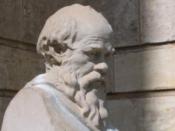The Trial of Socrates
Author: I.F. Stone
I.F. Stone a self described civil libertarian set out to write a book about freedom of speech; his research naturally led him back to ancient Athens, the earliest society where freedom of thought and expression flourished. In studying a society so renowned for the afore mentioned freedoms one cannot ignore what appears to be a total contradiction to all that Athens stood for, the trial and execution of Socrates. In the preface of his book, Stone speaks of the spectacle of Socrates before his judges. He calls the trial of Socrates, "a black mark for Athens and the freedom it symbolized," he questions, "how the trial of Socrates could have happened in so free a society," and asks even more importantly, "How could Athens have been so untrue to itself." To attempt to answer these questions we first need to explore how Socrates differed politically from the Athenians and why these long-term differences suddenly lead to his trial in 399BC; and secondly what about Socrates and his political beliefs made the outcome inevitable?
Finding answers to these questions is made infinitely more difficult because Socrates left no writings of his own.
The two surviving accounts of the trial come from Plato and Xenophon both disciples of Socrates and intent on showing their teacher in a favorable light. In addition to Plato and Xenophon, we have the portrait that emerges from the comedies of Aristophanes, most prominently the Clouds, a whole play devoted to his friend Socrates. We also catch some useful glimpses of Socrates two generations later in the works of Aristotle, whose references to Socrates differ greatly from those of his teacher Plato's. It is from these surviving accounts we can draw a picture of Socrates and his differences from his...


